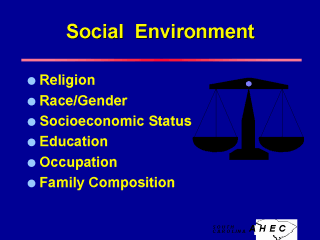| front |1 |2 |3 |4 |5 |6 |7 |8 |9 |10 |11 |12 |13 |14 |15 |16 |17 |18 |19 |20 |21 |22 |23 |24 |review |
 |
Social Environment Social factors have a strong impact on health. Race, income, level of education, gender, location, and occupation are some that have been studied. The way societies are governed affects policy decisions, which have implications for distribution of resources and access to health care. "Over time… socially designed systems have become more important than the physical environment to individual survival because they control the distribution of and access to those very factors that now determine mortality levels". John Ratcliffe, 1980 Religion- Some religions have guidelines that impact on health. For example, Seventh Day Adventists are encouraged to eat a modified vegetarian diet, not to smoke or to drink alcohol. This religious group has significantly less cancer and heart disease rates than the national average. It is thought that it is the practice of specific health habits, rather than a specific religious belief, that accounts for the better health outcomes. Gender-Throughout the world, women tend to have lower mortality rates and longer life expectancies than men do. In general, women tend to seek medical advice sooner than men do but all of the reasons for the difference in mortality rates have not yet been identified. |
| front |1 |2 |3 |4 |5 |6 |7 |8 |9 |10 |11 |12 |13 |14 |15 |16 |17 |18 |19 |20 |21 |22 |23 |24 |review |